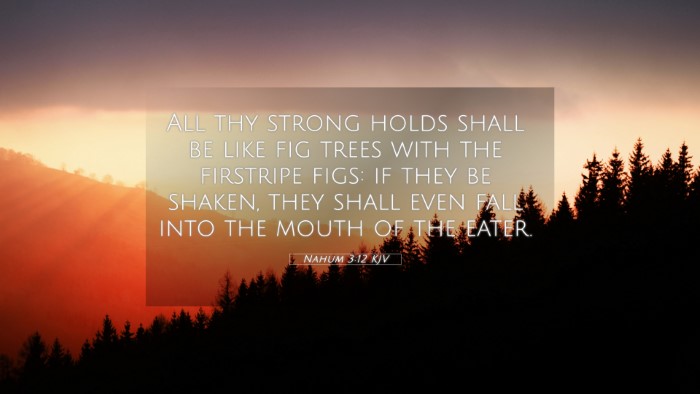Old Testament
Genesis Exodus Leviticus Numbers Deuteronomy Joshua Judges Ruth 1 Samuel 2 Samuel 1 Kings 2 Kings 1 Chronicles 2 Chronicles Ezra Nehemiah Esther Job Psalms Proverbs Ecclesiastes Song of Solomon Isaiah Jeremiah Lamentations Ezekiel Daniel Hosea Joel Amos Obadiah Jonah Micah Nahum Habakkuk Zephaniah Haggai Zechariah MalachiNahum 3:12 Similar Verses
Nahum 3:12 Cross References
All thy strong holds shall be like fig trees with the firstripe figs: if they be shaken, they shall even fall into the mouth of the eater.
Uncover the Rich Themes and Topics of This Bible Verse
Listed below are the Bible themes associated with Nahum 3:12. We invite you to explore each theme to gain deeper insights into the Scriptures.
Nahum 3:12 Cross Reference Verses
This section features a detailed cross-reference designed to enrich your understanding of the Scriptures. Below, you will find carefully selected verses that echo the themes and teachings related to Nahum 3:12 KJV. Click on any image to explore detailed analyses of related Bible verses and uncover deeper theological insights.

Revelation 6:13 (KJV) »
And the stars of heaven fell unto the earth, even as a fig tree casteth her untimely figs, when she is shaken of a mighty wind.

Isaiah 28:4 (KJV) »
And the glorious beauty, which is on the head of the fat valley, shall be a fading flower, and as the hasty fruit before the summer; which when he that looketh upon it seeth, while it is yet in his hand he eateth it up.

Habakkuk 1:10 (KJV) »
And they shall scoff at the kings, and the princes shall be a scorn unto them: they shall deride every strong hold; for they shall heap dust, and take it.
Nahum 3:12 Verse Analysis and Similar Verses
Nahum 3:12 - Meaning and Interpretation
Nahum 3:12 states, "All thy strongholds shall be like fig trees with the first ripe figs: if they be shaken, they shall even fall into the mouth of the eater." This verse offers a powerful metaphor indicating the vulnerability of Nineveh, the capital of Assyria, in the face of impending divine judgment. To provide clarity and insight, several public domain commentaries will be explored, including those by Matthew Henry, Albert Barnes, and Adam Clarke.
Contextual Background
By understanding the context of Nahum’s prophecy, we can comprehend the dire warning he presents to Nineveh about its downfall. The city, once a symbol of power and pride, is portrayed here as fragile and doomed to destruction.
Summary of Commentary Insights
-
Matthew Henry's Commentary
Henry elaborates on the metaphor of "fig trees with the first ripe figs," suggesting that these figs represent Nineveh's false sense of security and strength. Just like figs that fall when shaken, the city's defenses would be easily dismantled, showcasing their inevitable destruction.
-
Albert Barnes' Commentary
Barnes points out that the abundant growth of fig trees symbolizes the potential of quick defeat for Nineveh’s strongholds. He highlights that the powerful fortifications of the Assyrians would be no match for divine intervention, emphasizing the theme of God's sovereignty over nations.
-
Adam Clarke's Commentary
Clarke interprets the "mouth of the eater" as a representation of devastating consequences that await. He notes that just as ripe figs easily fall to the ground at the slightest disturbance, so would Nineveh succumb to its enemies, illustrating the futility of relying on earthly strength in contrast to divine judgment.
Bible Verse Cross-References
To deepen our understanding of Nahum 3:12, we can explore several cross-references that communicate similar themes of judgment, vulnerability, and divine sovereignty:
- Jeremiah 51:27 - Discusses the fall of Babylon, similar to Nineveh's impending doom.
- Amos 9:1 - A vivid depiction of divine judgment meant to shake the strongholds of the mighty.
- Isaiah 10:33-34 - A catastrophic imagery of the downfall of powerful nations.
- Micah 1:6 - Reflects on the destruction of cities and their fortifications.
- Matthew 24:2 - Jesus speaks of the fall of the temple, analogous to the inevitable falls of strongholds.
- Revelation 18:2 - Pertaining to the judgment against Babylon, echoing the themes in Nahum.
- Proverbs 1:26-27 - Wisdom speaks of calamity, much like the warning given in Nahum.
Thematic Connections
The overarching theme of Nahum 3:12 interlinks with multiple verses throughout Scripture, showcasing the fragility of human power against divine authority. Connecting these biblical texts through a comprehensive analysis enhances our understanding of God’s judgment and the fallibility of even the mightiest nations.
How to Use Bible Cross-References
Understanding the connections between Bible verses can be pivotal in gaining clarity on specific themes or doctrines. Here are some tools and methods to effectively utilize Bible cross-referencing:
- Bible Concordance: A tool that lists words and phrases found in the Bible, allowing for easy reference.
- Bible Cross-Reference Guide: A resource that helps find related scripture passages quickly.
- Cross-Reference Bible Study: Methods for exploring thematic links across both Testaments.
- Bible Chain References: A technique that interlinks verses based on themes or key phrases.
- Comprehensive Bible Cross-Reference Materials: Utilize study Bibles and reference books that provide extensive cross-references for deeper insight.
User Intent and Research
If you are seeking to understand how Nahum 3:12 connects with other Scriptures, you might ask:
- What verses are related to Nahum 3:12? Explore themes of judgment and downfall found throughout Scripture.
- Find cross-references for Nahum 3:12: Utilizing tools for comprehensively linking similar verses will enhance your study.
- How do Nahum 3:12 and Jeremiah 51:27 connect? Both portray God’s sovereignty in dismantling formidable nations.
- Similarities between Nahum 3:12 and Matthew 24:2: Both verses reflect on destruction, emphasizing divine pronouncement over human constructs.
Conclusion
Nahum 3:12 serves as a crucial verse that points to the fragility of human strongholds in the wake of divine judgment. Through exploring its rich metaphor and cross-references, we see how this prophetic message resonates with the broader themes of scripture regarding power, vulnerability, and God's absolute authority. By employing tools for cross-referencing, believers can deepen their understanding of God's word and the interconnectedness of biblical themes, enhancing their faith and knowledge.


